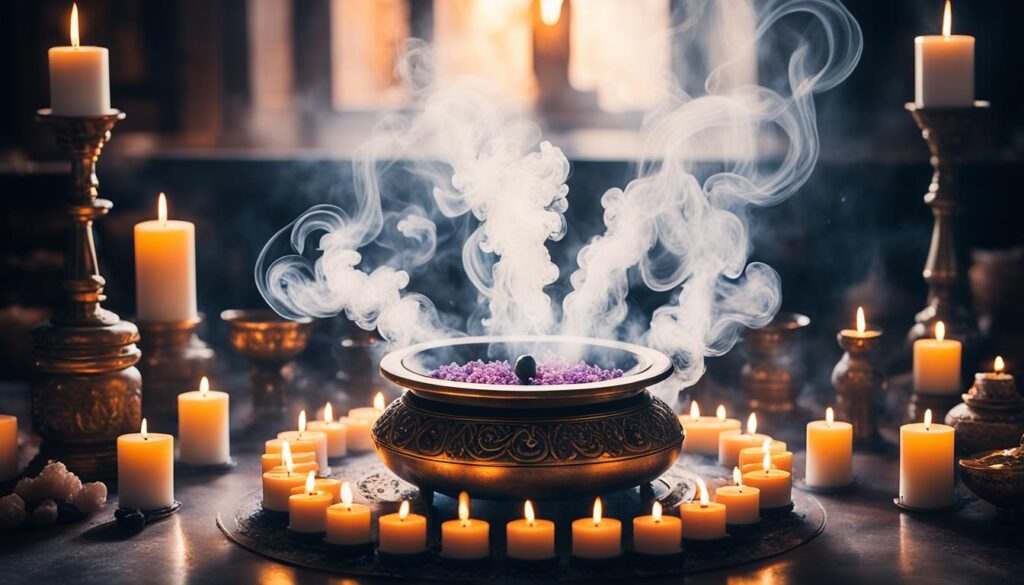Roses have the highest energy vibration rate of any flower. This fact opens up possibilities for spiritual scents and their meanings. Many people experience unexplained sweet smells, suggesting a common phenomenon.
Our brain’s limbic system processes scents, linking them to intuitive thoughts and feelings. This connection may explain why people encounter angelic fragrances during prayer or meditation. At the Christian Broadcasting Network, an employee experienced a powerful encounter with a mysterious sweet aroma.
Spiritual scents range from comforting rose smells to enlightening frankincense fragrances. These aromas might be more than pleasant sensations. They could be messages from the divine realm.
Let’s explore the spiritual significance of these sweet smells. We’ll examine how they might be interpreted as celestial communication. This journey into spiritual aromas promises to be enlightening.
The Spiritual meaning of Sweet Scents

Sweet scents play a key role in spiritual experiences. Divine aromas often guide us toward deeper connections with the divine. These metaphysical odors can awaken our spiritual senses, like coffee wakes up our body.
Many spiritual traditions see celestial perfumes as signs of divine presence. The Bible mentions a special anointing oil for making things “holy.” This practice shows the sacred nature of certain fragrances.
Believers are said to spread “the fragrance of the knowledge of Him.” This suggests that our spiritual essence can be sensed through scent.
Fr. Thomas Keating compares the first experience of God to perfume. This shows the power of divine aromas. When I encounter these scents, they often lead me to prayer and stillness.
Our spiritual sense of smell can be awakened by removing mental blocks. This inner change helps us become more open to celestial perfumes. By welcoming these divine aromas, we make room for meaningful spiritual growth.
Common Types of Spiritual Scents and Their Meanings

Etheric smells play a big role in spiritual experiences. These mystical scents often carry deep meanings and messages. Frankincense is a powerful scent linked to prayer and meditation.
When heated, frankincense releases its strongest aroma. This creates an atmosphere that helps with spiritual connection. Roses are another common spiritual scent.
The sweet smell of roses might show divine love or angels. Vanilla’s warm aroma is often linked to peace and contentment. Sandalwood, a woody scent, is thought to promote grounding.
These mystical scents can be a form of divine communication. In the Bible, “aroma” appears 13 times, showing its importance. The Old Testament mentions sweet savour offerings.
Mary’s act of anointing Jesus’ feet with costly perfume is a great example. It filled the house with fragrance, showing sacrificial love and devotion.
We can learn to understand these etheric smells better. Keeping a journal of scents and their contexts can help find patterns. This practice can deepen our spiritual connection.
Distinguishing Between Natural and Supernatural Aromas

Natural scents come from everyday sources like air fresheners or flowers. Celestial perfumes seem to appear out of nowhere. These metaphysical odors often surprise people with their sudden presence.
Sweet and floral scents top the list for spiritual experiences. Roses, lilies, and honey are common divine aromas. Exotic smells like cinnamon or myrrh can also signal celestial perfumes.
Tobacco scents were once linked to spiritual encounters. This connection peaked in the 20th century before declining.
To spot supernatural scents, pay attention to timing and surroundings. Divine aromas often appear without warning in unexpected places. They might come with other spiritual signs too.
Natural smells usually have a clear source you can find. Critical thinking helps determine if it’s an everyday scent or something mysterious.
Historical accounts offer clues about metaphysical odors. Saints’ rooms and holy sites were known for lingering pleasant scents. Ancient cultures tied specific smells to different gods.
Early Christians used scent to identify martyrs’ remains. These stories show how scent has been woven into spiritual experiences throughout history.
The Role of Aromatherapy in Spiritual Practices

Aromatherapy has deep roots in spiritual practices. Sacred aromas create a divine atmosphere. Essential oils and incense have enhanced spiritual experiences for thousands of years.
Spiritual scents like frankincense, myrrh, and sandalwood deepen meditation and promote awareness. These fragrances help achieve calm and clarity. Certain aromas induce relaxation and emotional balance, perfect for meditation and prayer.
Angelic fragrances are linked to divine communication. Plant scents are mentioned in spiritual texts as a way to connect. Aromatic herbs and oils are still used in temples, churches, and mosques.
Scent is seen as a pure sense, untainted by sin. It symbolizes immortality and union with the divine. Incorporating spiritual scents into daily life can be transformative.
Aromatherapy can enhance our spiritual journey through reiki, visualization, or manifestation practices. Sacred aromas open us to greater divine connection and spiritual attunement.
Personal Accounts of Spiritual Fragrance Encounters

People often report divine aromas without clear sources. These sweet smells appear during prayer or meditation. Many associate floral scents like roses or jasmine with spiritual presence.
A woman smelled vanilla during a tough time. She saw it as comfort from above. Research shows vanilla can reduce stress and boost mood.
A man caught a whiff of sandalwood while grieving. He felt it was his late father’s presence.
These encounters make people ponder the meaning of sweet smells. This is called clairalience or psychic smelling. It’s thought to be spiritual communication.
Keeping a journal can help spot patterns in these experiences. It may reveal messages behind these divine aromas.
Science can’t fully explain these events. Yet, many find comfort in unexplained sweet smells. These fragrant encounters often leave a lasting impact.
Interpreting Sweet Smells as Divine Communication
Celestial perfumes can be a powerful form of divine communication. Many people experience mystical scents without an obvious source. These fragrances often carry deep spiritual meaning.
Sweet smells are frequently linked to angelic presences. The human nose can detect up to one trillion different odors. This sensitivity allows us to pick up on ethereal scents that may signal spiritual encounters.
Ancient cultures saw sweet aromas as signs of divine connection. The Bible mentions “pleasing aromas” in relation to sacrifices to God. Genesis 8:21 describes how Noah’s sacrifice pleased God, symbolizing acceptance after the flood.
Personal experiences with mystical scents can vary widely. Some people smell flowers or incense without a physical source. These celestial perfumes might appear during prayer or meditation.
Science can’t fully explain these phenomena yet. However, many believe they represent a form of spiritual communication. These experiences often occur during times of spiritual reflection.
Developing Spiritual Sensitivity to Celestial Aromas
Developing sensitivity to spiritual scents requires practice. Our five natural senses align with prophetic abilities in the spirit realm. We can sharpen both our physical and spiritual senses.
Regular prayer and meditation enhance our spiritual awareness. I start my day with quiet reflection and mindful breathing. This practice has made me more attuned to subtle spiritual phenomena.
Sometimes, I notice a sweet aroma with no physical source. This can be a sign of celestial presence.
Biblical examples support this concept. Jesus sensed Nathanael under a fig tree through spiritual sight. Philip heard an angel’s instructions to travel to Gaza.
These stories inspire me to stay open to divine communication through various senses. Discernment is crucial when interpreting spiritual experiences. I trust my intuition but also seek guidance from spiritual mentors.
They’ve helped me differentiate between natural and supernatural aromas. This has deepened my understanding of spiritual scents.
Incorporating Spiritual Scents into Daily Life
Sacred aromas can deepen your spiritual connection. Vanilla, from an orchid species, holds deep spiritual meaning. Its sweet scent promotes calmness and eases anxiety, perfect for meditation or prayer.
I light vanilla-scented candles during morning rituals. This soothing scent helps start the day peacefully. For midday relaxation, I use vanilla essential oil in a diffuser.
This practice fills my space with divine aromas. It also sharpens intuition and enhances spiritual awareness. In the evening, I use vanilla-infused lotion before sleep.
This creates a nurturing environment for prophetic dreams. Studies show vanilla can positively affect mood and emotions. It aids in stress reduction and promotes tranquility.
Mindfully using these scents improves overall well-being and spiritual growth. Their presence reminds me of my divine connection throughout the day.
The Science Behind Unexplained Sweet Smells
Many people wonder about the spiritual meaning of sweet smells. While some see them as celestial perfumes, science offers other explanations. Phantosmia, or olfactory hallucinations, can make people smell non-existent odors.
A study of 7,417 Americans over 40 found interesting results. One in 15 people experience phantom smells. Women are twice as likely to be affected as men.
These mysterious scents may have medical causes. They can be linked to temporal lobe seizures, epilepsy, or migraines. Doctors use MRIs and CT scans to find physical reasons.
The idea of spiritual scents has deep roots. Ancient cultures used perfumes in religious rituals. They believed these scents were sacred. Frankincense and myrrh were prized for their heavenly smell and spiritual meaning.
Today, some people still link certain fragrances to divine presence. This blends ancient beliefs with modern experiences of celestial perfumes. It’s important to consider both spiritual and scientific views when exploring these sweet aromas.
